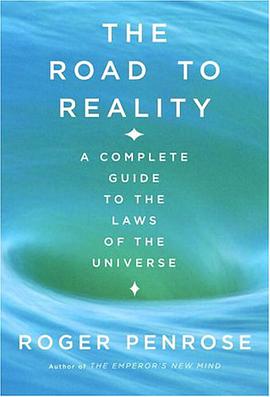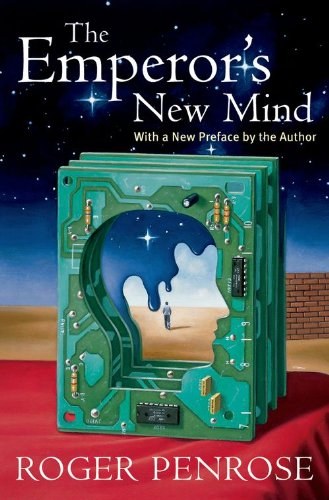The Road to Reality 豆瓣
作者:
Roger Penrose
Knopf
2005
- 2
From one of our greatest living scientists, a magnificent book that provides, for the serious lay reader, the most comprehensive and sophisticated account we have yet had of the physical universe and the essentials of its underlying mathematical theory.
Since the earliest efforts of the ancient Greeks to find order amid the chaos around us, there has been continual accelerated progress toward understanding the laws that govern our universe. And the particularly important advances made by means of the revolutionary theories of relativity and quantum mechanics have deeply altered our vision of the cosmos and provided us with models of unprecedented accuracy.
What Roger Penrose so brilliantly accomplishes in this book is threefold. First, he gives us an overall narrative description of our present understanding of the universe and its physical behaviors–from the unseeable, minuscule movement of the subatomic particle to the journeys of the planets and the stars in the vastness of time and space.
Second, he evokes the extraordinary beauty that lies in the mysterious and profound relationships between these physical behaviors and the subtle mathematical ideas that explain and interpret them.
Third, Penrose comes to the arresting conclusion–as he explores the compatibility of the two grand classic theories of modern physics–that Einstein’s general theory of relativity stands firm while quantum theory, as presently constituted, still needs refashioning.
Along the way, he talks about a wealth of issues, controversies, and phenomena; about the roles of various kinds of numbers in physics, ideas of calculus and modern geometry, visions of infinity, the big bang, black holes, the profound challenge of the second law of thermodynamics, string and M theory, loop quantum gravity, twistors, and educated guesses about science in the near future. In The Road to Reality he has given us a work of enormous scope, intention, and achievement–a complete and essential work of science
从古希腊人探寻我们身边的秩序与混沌的最早期的努力开始,人们对支配着我们生活的宇宙的法则的理解也在不断加速。而通过相对论与量子力学这样的革命性理论而取得的重要进展,已经深刻地改变了我们观察宇宙的视野。在这本书中,作者Roger Penrose首先对我们目前对宇宙的理解给出一个全面的概述,从我们看不到的亚原子粒子的微小运动到漫天星斗的运行。在物质的世界与用以解释和描述它们的微妙的数理概念之间存在一种关系,揭示这一关系中所呈现的美是作者接下来要做的事。在此基础上,作者又进而对现有的理论加以思考。依着这一思路,他在此书讨论了大量的问题、争论以及现象,不仅是前面提到的相对论,还包括正诱惑着科学家们智慧的膜理论等。作者彭罗斯早已为中国读者所熟悉,他曾于1988年与霍金共同分享当年授予物理学家的沃尔夫奖。他的作品《皇帝新脑》、《时空本性》(与霍金合著)此前曾在我国翻译出版。来自《星期天泰晤士报》的评论说,彭罗斯的书揭示了纠结在自然与人类想像力之间的美与精妙之处。
Since the earliest efforts of the ancient Greeks to find order amid the chaos around us, there has been continual accelerated progress toward understanding the laws that govern our universe. And the particularly important advances made by means of the revolutionary theories of relativity and quantum mechanics have deeply altered our vision of the cosmos and provided us with models of unprecedented accuracy.
What Roger Penrose so brilliantly accomplishes in this book is threefold. First, he gives us an overall narrative description of our present understanding of the universe and its physical behaviors–from the unseeable, minuscule movement of the subatomic particle to the journeys of the planets and the stars in the vastness of time and space.
Second, he evokes the extraordinary beauty that lies in the mysterious and profound relationships between these physical behaviors and the subtle mathematical ideas that explain and interpret them.
Third, Penrose comes to the arresting conclusion–as he explores the compatibility of the two grand classic theories of modern physics–that Einstein’s general theory of relativity stands firm while quantum theory, as presently constituted, still needs refashioning.
Along the way, he talks about a wealth of issues, controversies, and phenomena; about the roles of various kinds of numbers in physics, ideas of calculus and modern geometry, visions of infinity, the big bang, black holes, the profound challenge of the second law of thermodynamics, string and M theory, loop quantum gravity, twistors, and educated guesses about science in the near future. In The Road to Reality he has given us a work of enormous scope, intention, and achievement–a complete and essential work of science
从古希腊人探寻我们身边的秩序与混沌的最早期的努力开始,人们对支配着我们生活的宇宙的法则的理解也在不断加速。而通过相对论与量子力学这样的革命性理论而取得的重要进展,已经深刻地改变了我们观察宇宙的视野。在这本书中,作者Roger Penrose首先对我们目前对宇宙的理解给出一个全面的概述,从我们看不到的亚原子粒子的微小运动到漫天星斗的运行。在物质的世界与用以解释和描述它们的微妙的数理概念之间存在一种关系,揭示这一关系中所呈现的美是作者接下来要做的事。在此基础上,作者又进而对现有的理论加以思考。依着这一思路,他在此书讨论了大量的问题、争论以及现象,不仅是前面提到的相对论,还包括正诱惑着科学家们智慧的膜理论等。作者彭罗斯早已为中国读者所熟悉,他曾于1988年与霍金共同分享当年授予物理学家的沃尔夫奖。他的作品《皇帝新脑》、《时空本性》(与霍金合著)此前曾在我国翻译出版。来自《星期天泰晤士报》的评论说,彭罗斯的书揭示了纠结在自然与人类想像力之间的美与精妙之处。

